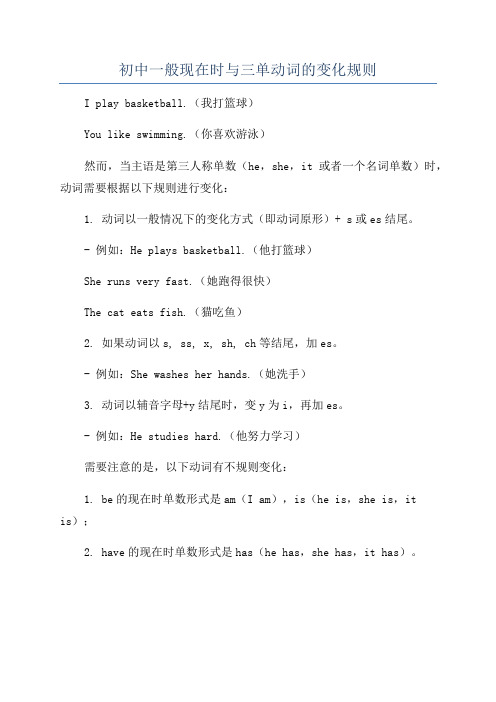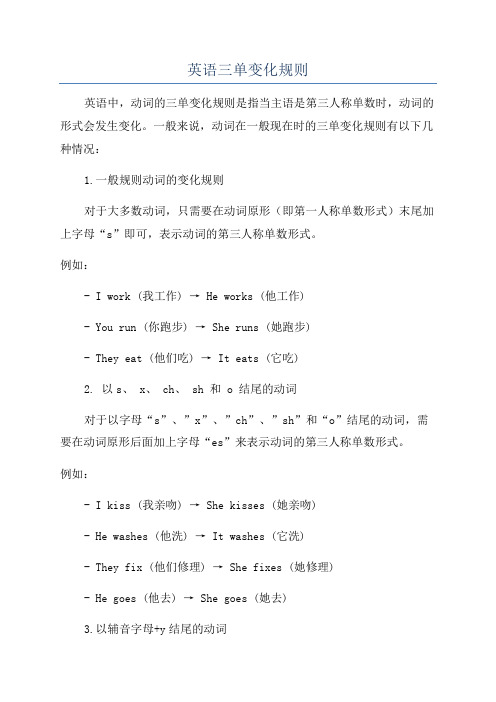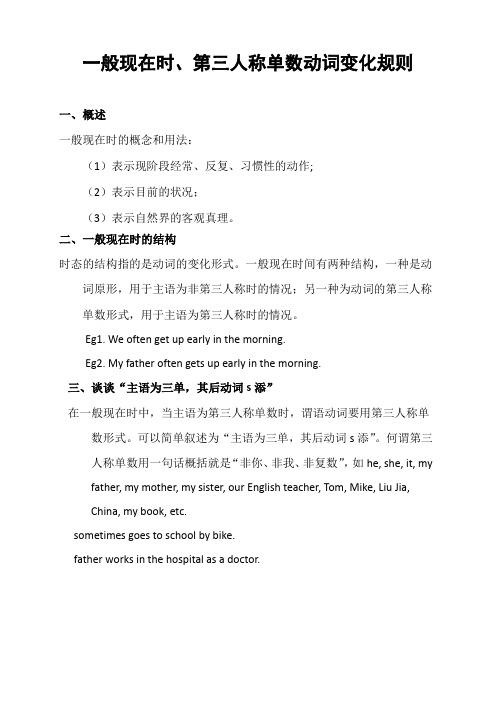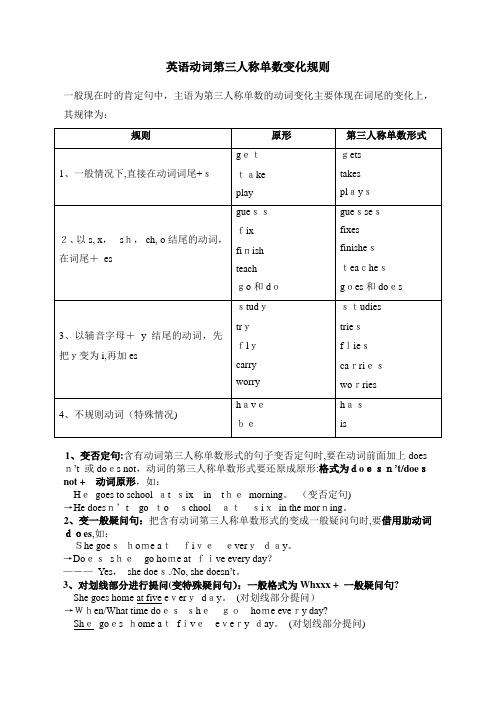初中一般现在时与三单动词的变化规则
初中一般现在时与三单动词的变化规则

初中一般现在时与三单动词的变化规则
I play basketball.(我打篮球)
You like swimming.(你喜欢游泳)
然而,当主语是第三人称单数(he,she,it或者一个名词单数)时,动词需要根据以下规则进行变化:
1. 动词以一般情况下的变化方式(即动词原形)+ s或es结尾。
- 例如:He plays basketball.(他打篮球)
She runs very fast.(她跑得很快)
The cat eats fish.(猫吃鱼)
2. 如果动词以s, ss, x, sh, ch等结尾,加es。
- 例如:She washes her hands.(她洗手)
3. 动词以辅音字母+y结尾时,变y为i,再加es。
- 例如:He studies hard.(他努力学习)
需要注意的是,以下动词有不规则变化:
1. be的现在时单数形式是am(I am),is(he is,she is,it is);
2. have的现在时单数形式是has(he has,she has,it has)。
英语三单变化规则

英语三单变化规则英语中,动词的三单变化规则是指当主语是第三人称单数时,动词的形式会发生变化。
一般来说,动词在一般现在时的三单变化规则有以下几种情况:1.一般规则动词的变化规则对于大多数动词,只需要在动词原形(即第一人称单数形式)末尾加上字母“s”即可,表示动词的第三人称单数形式。
例如:- I work (我工作) → He works (他工作)- You run (你跑步) → She runs (她跑步)- They eat (他们吃) → It eats (它吃)2. 以s、 x、 ch、 sh 和 o 结尾的动词对于以字母“s”、”x”、”ch”、”sh”和“o”结尾的动词,需要在动词原形后面加上字母“es”来表示动词的第三人称单数形式。
例如:- I kiss (我亲吻) → She kisses (她亲吻)- He washes (他洗) → It washes (它洗)- They fix (他们修理) → She fixes (她修理)- He goes (他去) → She goes (她去)3.以辅音字母+y结尾的动词对于以辅音字母“y”结尾的动词,需要将“y”变为“i”,并加上字母“es”来表示动词的第三人称单数形式。
例如:- I study (我学习) → He studies (他学习)- You fly (你飞) → She flies (她飞)- They try (他们尝试) → It tries (它尝试)4.以“o”结尾的动词对于以字母“o”结尾的动词,一般来说,需要在动词原形后面加上字母“es”来表示动词的第三人称单数形式。
例如:- I do (我做) → He does (他做)- You go (你去) → She go es (她去)- They have (他们有) → It has (它有)5.不规则动词除了以上的规则动词之外,还有一些动词的第三人称单数形式是不规则的,需要记住其具体形式。
一般现在时动词第三人称单数变化规则讲义与试题

一般现在时、第三人称单数动词变化规则一、概述一般现在时的概念和用法:(1)表示现阶段经常、反复、习惯性的动作;(2)表示目前的状况;(3)表示自然界的客观真理。
二、一般现在时的结构时态的结构指的是动词的变化形式。
一般现在时间有两种结构,一种是动词原形,用于主语为非第三人称时的情况;另一种为动词的第三人称单数形式,用于主语为第三人称时的情况。
Eg1. We often get up early in the morning.Eg2. My father often gets up early in the morning.三、谈谈“主语为三单,其后动词s添”在一般现在时中,当主语为第三人称单数时,谓语动词要用第三人称单数形式。
可以简单叙述为“主语为三单,其后动词s添”。
何谓第三人称单数用一句话概括就是“非你、非我、非复数”,如he, she, it, my father, my mother, my sister, our English teacher, Tom, Mike, Liu Jia,China, my book, etc.sometimes goes to school by bike.father works in the hospital as a doctor.四、一般现在时的肯定句中,主语为第三人称单数的动词变化主要体现在词尾的变化上,其规律为:(与名词变成复数的变法大致相同。
)五、一般现在时的句子转换(1)当句子中有be动词或情态动词时,则把be动词或情态动词(can,could 等等)提到主语的前面变成一般疑问句;在be动词或情态动词后面加not变成否定句.例:①陈述句:She is a student.一般疑问句→Is she a student否定句→She is not a student.②陈述句:I can swim.一般疑问句→Can you swim否定句→I can not swim.(2)当句子中即没有be动词,也没有情态动词时,则在主语前加助动词do (you,以及复数), does(单数she,he,it)变成一般疑问句;在主语后谓语动词前加助动词don’t(I,you,以及复数), doesn’t(单数she,he,it)变成否定句,助动词后的动词要变成动词原形。
英语动词第三人称单数形式的变化规则

英语动词第三人称单数变化规则一般现在时的肯定句中,主语为第三人称单数的动词变化主要体现在词尾的变化上,其规律为:1、变否定句:含有动词第三人称单数形式的句子变否定句时,要在动词前面加上does n’t 或does not,动词的第三人称单数形式要还原成原形:格式为doesn’t/doesnot +动词原形,如:Hegoes to school at six in themorning。
(变否定句)→He doesn’t go toschoolatsixin the morning。
2、变一般疑问句:把含有动词第三人称单数形式的变成一般疑问句时,要借用助动词does,如:She goeshome atfiveeveryday。
→Doesshego home at five every day?—-—Yes,she does./No, she doesn’t。
3、对划线部分进行提问(变特殊疑问句):一般格式为Whxxx + 一般疑问句?She goes home at five everyday。
(对划线部分提问)→When/What time doesshegohome every day?Shegoes home atfiveevery day。
(对划线部分提问)→Who goeshome atfiveevery day?Shegoeshome at five every day。
(对划线部分提问)→What doesshe do at fiveeveryday?哪些主语是第三人称单数?1、人称代词he, she, it;如:He likes watching TV. 他喜欢看电视.She haslunchattwelve. 她十二点吃午餐.Itlooks like a cat。
它看起来像只猫.2、单个人名、地名或称呼作主语;是第三人称单数。
如:Han Meilooks like her mother。
一般现在时主语三单的动词变化及练习

一般如今时主语单三人称时的动词变更【1 】①在一般如今时中,当主语为第三人称单数时,动词要用“s”型(即第三人称单数情势).②所谓动词“s”型的组成,与名词变复数类似,即:a)在动词尾直接加 s.如:play—plays, want—wants, work—works, know—knows, help—helps,get—getsb)以字母s.ss.x.ch.sh或o结尾的动词加es;如:guess—guesses, fix—fixes, teach—teaches, brush—brushes, go—goes,do—does,watch—watches,catch—catches c)以子音字母+y结尾的动词,先变y为i,再加es.如:study—studies,carry—carries,fly—flies,worry—worries第三人称单数演习一.请选出准确的答案:1. She (like / likes) to play football.2. He (like / likes) drinking milk.3. I (like / likes) to watch TV.4. We (like / likes) to play badminton.5. They (like / likes) to sing songs.6. She (read / reads) books every day.7. He (play / plays) computer games every day.8. It (listen / listens) to the radio every day.9. Linda (draw / draws) pictures every day.10. Jane and Linda (play / plays) football every day.二.请用动词的恰当情势填空.1.Let him _____(play)basketball.2.Everyone_____(know)what he really like.3.Those girls____(be)my sister.4.That girl_____(call)me every Sunday.5.How___(do)she_____(spell)the word?6. He________ TV every evening. (watch)7. We always ________ to school on foot. (go)8. Tom, with his classmates, often ______ football after school. (play)9. Your shoes _______ under the bed. (be)10. ______ here and ______ by me. (come, stand)11. His uncle usually _________ to work by bus. (go)12. I always ______ up at six in the morning.(get)13. John ________ like his father. (look)三.请用 have或has填空.1.I ________ a nice picture.2.He ________ a good friend.3.They _________ some kites.4.We ________ some flowers.5.She __________ a duck.6.My father __________ a new bike.7.Her mother _________ a vase.8.Our teacher _________ an English book.9.Our teachers _________ a basketball.10.Their parents __________ some story books.11.Nancy _______ many skirts.12.David ________ some jackets.13.My friends ________ a football.14.What do you ________ ?15.What does Mike ________ ?四.否认句:在动词前+doesn't或don't.1.She_____ _____(do)her homework every day.2.He_____ _____(live)in Shanghai.3.He_____ _____(need)a pair pf shoes.4.Danny_____ _____(see)the apple tree?5.She_____ _____(come)from America.6.The girl_____ _____(look)out of the window and sees many birds in the sky.五.Do照样Does我来选.1. [Do/Does]______ he watch TV at night? Yes he does.2. [Do/Does]______ you go to school everyday? No, I don’t.3. [Do/Does]______ Jack and Peter like apples?4. [Do/Does]______ Tina go swimming on Sunday?5. [Do/Does]______they play football? Yes, they ___[do/does].6. [Do/Does]______ we have a good teacher? Yes, we ____[do/does].7. [Do/Does]_____ they jump rope ? No, they ___[do not/does not].8. [Do/Does]_____your dog walk in the zoo?9. [Do/Does]____ I have a big nose? No, you _____[do not/does not].10. [Do/Does]____ your cats eat fish? Yes, they _____.[do/does].11. [Do/Does]_____ their mothers go shopping? No, they ____[do not/does not].12. I ___[do not/ does not] speak Japanese. [Do/Does] _____you speak Japanese?六.请用动词的恰当情势填空.1._____the desk_____(have)four legs?Yes,it does.2._____she____(do)her homework every day?Yes,she does.3._____he_____(live)in Jinan?No,he doesn't.4._____he_____(need)a pair of shoes?NO,he doesn't.5.Does Danny_____(see)the apple tree?6._____she_____(come)from America?Yes,she_____.7._____the girl_____(look)out of the window and sees many birds in the sky? No,she_____.8. Jenny runs home and_____(sit)on the chair?七.选择题:1. I _____ to school every day.A. goB. goesC. going2. He _____ teeth every morning.A. brushB. brushesC. brushing3. The birds_____ singing.A. likeB. likesC. like to4. What does Lily _____ doing?A. likeB. likesC. to5. _____ you like eating apples?A. DoB. DoesC. Doing6. _____ he swim every afternoon?A. DoB. DoesC. Doing7. Tom likes _____ in the classroom.A. singingB. singC. to singing8. –Does Sally like swimming?No, she .A. doB. doesC. doesn’t9. Peter and Mary _____ milk every day.A. drinkB. drinkingC. drinks10. _____ they read English every day?A. DoesB. AreC. Do八.把下列句子变成否认句:1. She draws pictures every day.2. We like playing football.九.把下列句子变成一般疑问句,并做确定答复.1. Linda swims every day.2. They like playing games.。
主语是第三人称单数时,英语动词的变化规则

语是第三人称单数时,英语动词的变更规则动词,在英语众多词汇中堪称变脸的高手,遇到分歧的人称、数和时态,它总会以分歧的面孔登场。
本期将重点向同学们介绍在一般现在时的句子中,当主语是第三人称单数英语动词的变更规则。
一般现在时的肯定句中,主语为第三人称单数的动词变更主要体现在词尾的变更上,其规律大体有三点:1. 一般情况下,直接在动词词尾+s ,例如:get→gets; take→takes2. 以s, sh, ch, x, o 结尾的动词,在词尾+ es,例如:teach→ teaches; fix→fixes;go→goes3. 以辅音字母+ y 结尾的动词,变y 为,再+ es,如:study→ studies; try→tries除上述规律外,还应注意下面三点:1. 动词have ,遇到主语是第三人称单数时,要用has动词be 的第三人称单数形式是is。
2. 含有动词第三人称单数形式的句子变否定句时,要用doesn't + 动词原形,如:He goes to school at six in the morning. (变否定句)→ He doesn't go to school at six in the morning.3. 对含有动词第三人称单数形式的句子提问时,要用助动词does,如:She goes home at five every day. (对划线部分提问)→ When / What time does she go home every day?综上所述,只要我们洞悉了英语动词第三人称单数形式的变更规则,在一般现在时的句子中,我们都能从容应对,客随主“变”了。
大家都知道,在一般现在时中,当主语是第三人称单数时,谓语动词要用第三人称单数形式,即常在动词原形-s或-es。
但有些同学们对于哪些主语是第三人称单数还不十分清楚,现归纳总结如下:一、人称代词he, she, it是第三人称单数。
动词三单的变化规则

动词三单的变化规则
动词第三人称单数变化规则如下:
1)一般情况下,动词后面直接加-s.
例如: works gets says reads
2) 以ch,sh,s,x 或 o 结尾的动词,在后面加 -es。
例如: go- goes teach-,teaches,wash-washes。
brush-brushes ,catch-catches,do-does ,fix -fixes
3) 以辅音字母 + y结尾的动词,把 y变为 i 再加 -es. 例如:study- studies try-tries carry-carries,fly-flies
一般现在时的肯定句中,主语为第三人称单数的动词变化主要体现在词尾的变化上,其规律大体有三点:
(1) 一般情况下由动词后加-s构成。
如work / works
(2) 以s, x, z, sh, ch 以及字母o结构的动词,后加-es:
guess / guesses, mix / mixes, go /
goes, buzz / buzzes, finish / finishes, catch / catches等。
(3) 以辅音字母加y结尾的动词,应将y改为i 再加-es:fly / flies, study / studies
等。
【注】①有个别的变化不规则,如have / has, be / is等。
②词尾-s和-es 读音规则是:在s, x, z, sh, ch 后的es读作[iz],其余的读作[z]。
完整版一般现在时动词第三人称单数变化规则

一、概述一般现在时的概念和用法:(1)表示现阶段经常、反复、习惯性的动作;(2)表示目前的状况;(3)表示自然界的客观真理。
二、一般现在时的结构时态的结构指的是动词的变化形式。
一般现在时间有两种结构,一种是动词原形,用于主语为非第三人称时的情况;另一种为动词的第三人称单数形式,用于主语为第三人称时的情况。
Eg1. We often get up early in the morning.Eg2. My father ofte n gets up early in the morning.三、谈谈主语为三单,其后动词s添”在一般现在时中,当主语为第三人称单数时,谓语动词要用第三人称单数形式。
可以简单叙述为主语为三单,其后动词s添”。
何谓第三人称单数?用一句话概括就是非你、非我、非复数”,如he, she, it, my father, my mother, my sister, our English teacher, Tom, Mike, Liu Jia, China, my book, etc.Eg3.He sometimes goes to school by bike.Eg4.My father works in the hospital as a doctor.四、一般现在时的肯定句中,主语为第三人称单数的动词变化主要体现在词尾的变化上,其规律为:(与名词变成复数的变法大致相同。
)五、一般现在时的句子转换(1)当句子中有be动词或情态动词时,则把be动词或情态动词(can,could等等)提到主语的前面变成一般疑问句;在be动词或情态动词后面加not变成否定句.例:①陈述句:She is a student. 一般疑问句—Is she a stude nt? 否定句—She is not a stude nt.②陈述句:I can swim.一般疑问句—Can you swim否定句f I can not swim.(2)当句子中即没有be动词,也没有情态动词时,则在主语前加助动词do (you,以及复数),does(单数she,he,it)变成一般疑问句;在主语后谓语动词前加助动词don' t I,you,以及复数),doesn '单数she,he,i)变成否定句,助动词后的动词要变成动词原形。
- 1、下载文档前请自行甄别文档内容的完整性,平台不提供额外的编辑、内容补充、找答案等附加服务。
- 2、"仅部分预览"的文档,不可在线预览部分如存在完整性等问题,可反馈申请退款(可完整预览的文档不适用该条件!)。
- 3、如文档侵犯您的权益,请联系客服反馈,我们会尽快为您处理(人工客服工作时间:9:00-18:30)。
一般现在时1.概念:经常、反复发生的动作或行为及现在的某种状况。
2.时间状语:always,usually,often,sometimes,every week(day,year,month…),once a week, on Sundays,3.基本结构:动词原形/第三人称单数形式(如主语为第三人称单数,动词上要改为第三人称单数形式)4.否定形式:am/is/are+not; 谓语动词若为动词,则在其前加don't,如主语为第三人称单数,则用doesn't,同时还原行为动词。
5.一般疑问句:把be动词放于句首;用助动词do提问,如主语为第三人称单数,则用does,同时,还原行为动词。
三单动词的变化规则1.一般情况下,直接加-s如:play—plays, want—wants, work—works, know—knows, help —helps,get—gets2.以s. x. sh. ch. o结尾,加-es如:guess—guesses, fix—fixes, teach—teaches, brush—brushes, go —goes,do—does,watch—watches,catch—catches3.以“辅音字母+y”结尾,变y为i, 再加-es如:study—studies,carry—carries,fly—flies,worry—worries一般现在时用法专练:一、写出下列动词的第三人称单数drink ________ go _______ stay ________ make ________look _________ have_______ pass_______ carry ____come________ watch______ plant_______ fly ________study_______ brush________ do_________ teach_______catch _________ wash_________ like________have______say_________ learn ________ eat________ read_________ sing_______二、用括号内动词的适当形式填空。
(一)1. He often ________(have) dinner at home.2. Daniel and Tommy _______(be) in Class One.3. We _______(not watch) TV on Monday.4. Nick _______(not go) to the zoo on Sunday.5. ______ they ________(like) the World Cup?6. What _______they often _______(do) on Saturdays?7. _______ your parents _______(read) newspapers every day?8. The girl _______(teach) us English on Sundays.9. She and I ________(take) a walk together every evening.10. There ________(be) some water in the bottle.11. Mike _______(like) cooking.12. They _______(have) the same hobby.13. My aunt _______(look) after her baby carefully.14. You always _______(do) your homework well.15. I _______(be) ill. I’m staying in bed.16. She _______(go) to school from Monday to Friday.17. Liu Tao _______(do) not like PE.18. The child often _______(watch) TV in the evening.19. Su Hai and Su Yang _______(have) eight lessons this term.20. -What day _______(be) it today? It’s Saturday.(二)1. We often___________(play) in the playgound.2. He usually _________(get) up at six o’clock.3.__________you_________(brush) your teeth every morning.4. What ________ (do) he usually_________ (do) after school?5. Danny _____ (study) English,Chinese,Maths,Science and Art at school.6. Mike sometimes __________(go) to the park with his sister.7. At eight at night, she __________(watch) TV with his parents.8. ________ Mike________(read) English every day?9.How many lessons______ your classmate________(have) on Monday?10. What time_________his mother_________(do) the housework?(四)1. I can take Li Ming there when he _____ ( come) to visit.2. _____your sister_____(know)English?3. Her home____ _____ ______(远离)her school.4. The pot_____(not look) like yours very much.5. Where _____you____(have)lunch every day?6. Who_____(想要)to go swimming?7. ______she_____(do) the housework every day?8. Jenny and Danny usually______(play) games in the afternoon(五)1.Where (be) John and Jack from?2. His favorite subjects (be) P.E. and music.3. His pen pal (live) in Toronto.4. he (have) any sisters?5. Ben can (speak) English and Spanish.6. Her brother (not play) sports every day, he only (watch) them on TV.7. My patents want (go) shopping on Sunday.8. She likes (play) computer games.9. When your mother (cook) breakfast every morning?10. There (be) some ice cream and hamburgers on the table.11. Mr White always (get) up early in the morning.12. Jack, together with his friends, (go) to park every week.13. Nick (have) lunch at school from Monday to Friday.14. There (be) seven days in a week.15. The students in our school (like) English.三、选择填空:( )1. I ________to school at 7:00 in the morning.A. goB. goingC. goes( )2. They _______books every day in the library.A.readsB. readC. reading ( )3. The monkey________ eating bananas very much.A.likeB. likesC. liking ( )4. My father ________to read newspaper after supper every day.A.likeB. likesC. liking ( )5. I like watching TV, but my mother _________like it.A. don’tB. doesn’tC. does( )6. ____________ your father drink milk every day?A. doB. areC. does()7. One of the boys_____ a black hat.A. haveB. there isC. there areD. has()8. We will go shopping if it____ tomorrow.A. don't rainB. didn't rainC. doesn't rainD.isn't rain ()9. Wang Mei ____ music and often ____ to music.A like; listenB likes; listensC like; are listeningD liking ; listen()10. Jenny____ English every evening.A has studyB studiesC studyD studied四、按照要求改写句子1. Daniel watches TV every evening.(改为否定句)___________________________________________________2. I do my homework every day.(改为一般疑问句,作否定回答)________________________________________________________ 3. She likes milk.(改为一般疑问句,作肯定回答)_______________________________________________________ 4. Amy likes playing computer games.(改为一般疑问句,作否定回答) ________________________________________________________ 5. We go to school every morning.(改为否定句)_______________________________________________________ 6. He speaks English very well.(改为否定句)___________________________________________________7. I like taking photos in the park.(对划线部分提问)________________________________________________________ 8. John comes from Canada.(对划线部分提问)___________________________________________________ 9. She is always a good student.(改为一般疑问句,作否定回答)________________________________________________________ 10. Simon and Daniel like going skating.(改为否定句)___________________________________________________五、改错(划出错误的地方,将正确的写在横线上)1. Is your brother speak English? __________________2. Does he likes going fishing? __________________3. He likes play games after class. __________________4. Mr. Wu teachs us English. __________________5. She don’t do her homework on Sundays. _________________。
